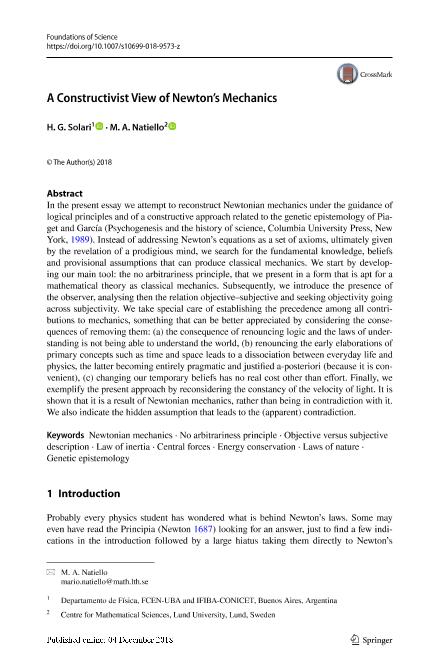Mostrar el registro sencillo del ítem
dc.contributor.author
Solari, Hernan Gustavo

dc.contributor.author
Natiello, Mario Alberto

dc.date.available
2020-02-07T23:16:37Z
dc.date.issued
2019-06
dc.identifier.citation
Solari, Hernan Gustavo; Natiello, Mario Alberto; A Constructivist View of Newton’s Mechanics; Springer; Foundations of Science; 24; 2; 6-2019; 307-341
dc.identifier.issn
1233-1821
dc.identifier.uri
http://hdl.handle.net/11336/97013
dc.description.abstract
In the present essay we attempt to reconstruct Newtonian mechanics under the guidance of logical principles and of a constructive approach related to the genetic epistemology of Piaget and García (Psychogenesis and the history of science, Columbia University Press, New York, 1989). Instead of addressing Newton’s equations as a set of axioms, ultimately given by the revelation of a prodigious mind, we search for the fundamental knowledge, beliefs and provisional assumptions that can produce classical mechanics. We start by developing our main tool: the no arbitrariness principle, that we present in a form that is apt for a mathematical theory as classical mechanics. Subsequently, we introduce the presence of the observer, analysing then the relation objective–subjective and seeking objectivity going across subjectivity. We take special care of establishing the precedence among all contributions to mechanics, something that can be better appreciated by considering the consequences of removing them: (a) the consequence of renouncing logic and the laws of understanding is not being able to understand the world, (b) renouncing the early elaborations of primary concepts such as time and space leads to a dissociation between everyday life and physics, the latter becoming entirely pragmatic and justified a-posteriori (because it is convenient), (c) changing our temporary beliefs has no real cost other than effort. Finally, we exemplify the present approach by reconsidering the constancy of the velocity of light. It is shown that it is a result of Newtonian mechanics, rather than being in contradiction with it. We also indicate the hidden assumption that leads to the (apparent) contradiction.
dc.format
application/pdf
dc.language.iso
eng
dc.publisher
Springer

dc.rights
info:eu-repo/semantics/openAccess
dc.rights.uri
https://creativecommons.org/licenses/by/2.5/ar/
dc.subject
CENTRAL FORCES
dc.subject
ENERGY CONSERVATION
dc.subject
GENETIC EPISTEMOLOGY
dc.subject
LAW OF INERTIA
dc.subject
LAWS OF NATURE
dc.subject
NEWTONIAN MECHANICS
dc.subject
NO ARBITRARINESS PRINCIPLE
dc.subject
OBJECTIVE VERSUS SUBJECTIVE DESCRIPTION
dc.subject.classification
Filosofía, Historia y Filosofía de la Ciencia y la Tecnología

dc.subject.classification
Filosofía, Ética y Religión

dc.subject.classification
HUMANIDADES

dc.title
A Constructivist View of Newton’s Mechanics
dc.type
info:eu-repo/semantics/article
dc.type
info:ar-repo/semantics/artículo
dc.type
info:eu-repo/semantics/publishedVersion
dc.date.updated
2019-10-22T17:58:12Z
dc.journal.volume
24
dc.journal.number
2
dc.journal.pagination
307-341
dc.journal.pais
Alemania

dc.journal.ciudad
Berlín
dc.description.fil
Fil: Solari, Hernan Gustavo. Consejo Nacional de Investigaciones Científicas y Técnicas. Oficina de Coordinación Administrativa Ciudad Universitaria. Instituto de Física de Buenos Aires. Universidad de Buenos Aires. Facultad de Ciencias Exactas y Naturales. Instituto de Física de Buenos Aires; Argentina
dc.description.fil
Fil: Natiello, Mario Alberto. Lund University; Suecia
dc.journal.title
Foundations of Science

dc.relation.alternativeid
info:eu-repo/semantics/altIdentifier/doi/http://dx.doi.org/10.1007/s10699-018-9573-z
dc.relation.alternativeid
info:eu-repo/semantics/altIdentifier/url/https://link.springer.com/article/10.1007%2Fs10699-018-9573-z
Archivos asociados
